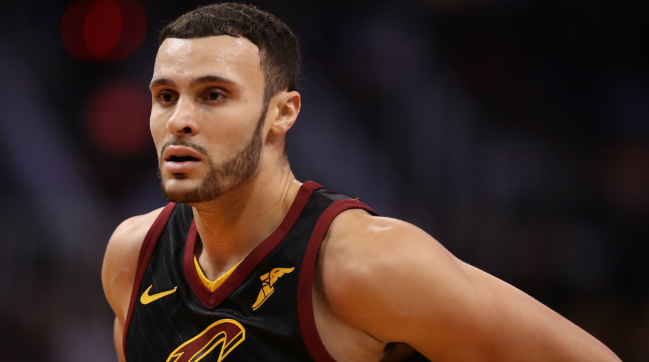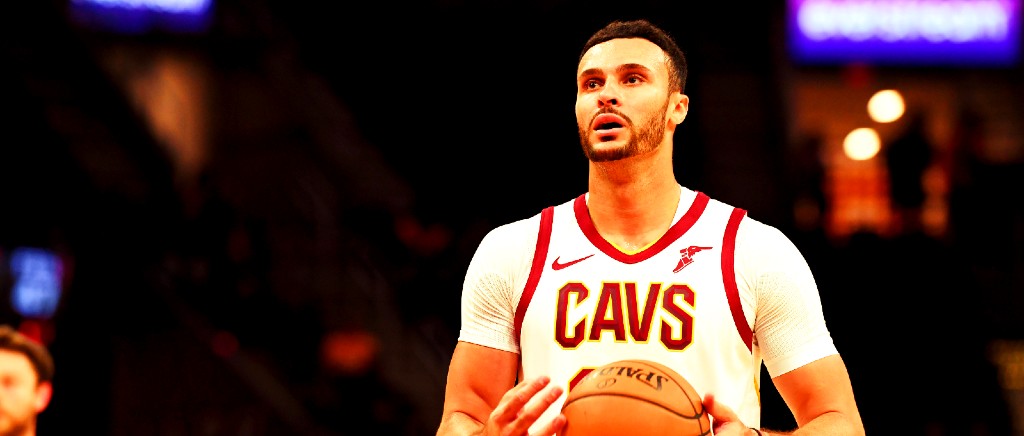Not to be overly poetic, but the rain was posting up Larry Nance Jr. When his voice sped up, the downpour did too, when he paused, considering a question, it slowed to a drizzle. There’s a rhythmic quality to his cadence that mirrored the atmospheric anomaly during our conversation — a charged alertness when being asked a question, a pause, a breath before answering, and then a considered, wide-open response, tonal lifts like petrichor rising.
It’s elemental, how Nance speaks, with an assurance felt deep down. Added to this is that everything in the conversation can be traced back to something he has felt with his body as a conduit, occasionally an especially brutal one.
At 16, Nance was diagnosed with Crohn’s disease after years of dealing with symptoms bad enough that the stress on his body had begun to stunt his growth. “It certainly takes a lot out of you, when you’re just sick and sick and sick and don’t even know why,” Nance says.
Folded in with the physical toll was the added psychological and bodily shifts all teenagers hit head on or are in the roiling middle of at that age. But looking back, Nance recalls the diagnosis as something of a lifeline, a clarifying shift in a time of confusion.
“Obviously, it was tough to hear that. Tough to hear, ‘Hey, here’s this disease that you’re going to have to live with for the rest of your life’ [and] however well you treat it or not, it’s always going to be there,” he recalls. “That was tough. But at the same time, I just was so thankful to be diagnosed finally. To finally know just what I was up against and once we realized that we could begin to fight it. Thankfully, knock on wood, I’ve been winning that fight ever since.”

It’s a fight that, compared to others, Nance downplays in as much as the way Crohn’s affects him can be managed with diligence in his diet and medication. He started early (“You definitely learn quick when you’re 16, 17, and you gotta talk to the lunch lady at school to see if there’s peanuts in the salad today”) and his diagnosis has not changed or complicated. For him, Crohn’s is a matter of routine. But the diseases of the human gastrointestinal tract and their effects can be as varied as the people they are bound up in, and the severity of a perfect stranger’s experience with Crohn’s would end up being a turning point in Nance’s approach and advocacy of the disease.
Nance met Noah Weber in 2016 — Weber was 11 and Nance was playing for the Lakers. On a long shot, Weber had sent Nance a DM on Instagram after reading an article about him that touched on his Crohn’s diagnosis, and the two struck up a correspondence. After meeting, Weber, who had already been on four different medications and undergone surgery, but was determined to become an athlete, ran the idea of a charity foundation by Nance that would aim to support young athletes struggling with some of the same things the pair had been through. In 2017, Athlete’s Vs. Crohn’s and Colitis (AVC) got its kindred start.
“With me and him, we had polar opposite experiences with Crohn’s,” Nance recalls of learning Weber’s story. “I was diagnosed at sixteen and for me, I got put on a drug called Remicade and pretty much, just about immediately, it turned my life around and I started feeling like a normal kid. But Noah on the other hand, Noah had started on Remicade, then switched to Humira, and then Entyvio, then he had surgery, and now he’s on Stelara. [Crohn’s is] just so very individualized,” he says, then perks up. “That’s what makes it such a good partnership. Because whoever we’re talking to, between me and him, we’ve covered the broad spectrum of it. We can relate to just about anybody.”
In its first two years, AVC had modest goals focused on spreading awareness and providing support for other young athletes going through what Weber and Nance had. As Nance puts it, to show kids that “no matter what, good days, bad days, there’s nothing that this disease can hold you back from.” With its growth and reception since, the foundation is now working to expand its tangible resources. Adding scholarships, mentorship programs, funding further research into Crohn’s and colitis, as well as partnering up with other Akron, Ohio mainstays like Goodyear for opportunities that award young athletes.
The most recent sponsorship, that gave its two winners a blimp ride, game tickets and time to meet him, had Nance dreamily reminiscent and slightly envious. “The Goodyear Blimp, just growing up in Akron, I’ve seen that going around, every time we used to see it go by we’d, everybody, would go outside and go watch it go past,” he trails off. “The fact that [contest winners] London and Colton got to go on that trip is just so cool. Cause that’s something that I need to do too.”
A few seconds later, the blimp cruising out of imagination, he adds, “I think we’re headed down the right track. I think any time your mission is to do good, you can’t go wrong.”
Nance has a knack for speaking in platitudes, but it’s sincere. He is nice in the way that people who have been through something that has taken a physical toll often are — disarming and inclined to make connections, if only for how unguarded they appear. As a teammate, he has touted himself as a bridge guy, establishing a unique role on a somewhat overlooked roster riding out a tumultuous year. It was a natural fit, formed around Nance who now, in his third season with Cleveland alongside formative players like Kevin Love and Tristan Thompson, has become similarly steady.
Nifty lob from Darius Garland to Larry Nance Jr.! #NBARooks
📲💻: https://t.co/lZZApswzuX pic.twitter.com/SxOMq85vvF
— NBA (@NBA) February 13, 2020
“It’s all about, for me at least, establishing a culture,” Nance says when asked how to maintain stability in a season with so much upheaval. “Obviously this year hasn’t gone the way any of us would’ve hoped it would. It’s been a struggle, it’s certainly been tough, but at the same time it’s something that we all have to take accountability for. Something that we all need to be on the same page with if this thing is going to turn around any time soon.”
When he says “this thing” he’s referring to the team, but it comes through in his intonation, in how familiar he is referring to something with so many components, that it’s a shorthand likely familiar to the entire roster. But for Nance, being a bridge guy, there’s a level of attention that becomes apparent when he starts to parcel out all the elements that come into play with a team working well.
“Making sure the rookies are getting their work in before practice, or making sure the vets are doing the right thing by the rookies and showing them the right way. We have guys that won a championship. We have guys that, this is the only basketball they’ve seen in the NBA. It’s certainly been,” he pauses, gives a small laugh, “a heck of a bridge to try to connect, but I enjoy it. I think there’s a lot of promise here. I’m just happy to be in the team and I’m very happy to be a part of the future of it.”
Connectivity is something that has long captivated Nance. As a kid, learning about his body and how to coax it out of daily revolt, turning it into an active collaborator over a passive form (“I’ve had to really, really pay attention”). He completed a bachelor’s degree in criminal justice while weighing the possibility of a professional career in basketball. Admitting he was torn, a retrospective bend in his voice, that he was “very much so going to be” a forensic lab technician had he not made it into the NBA. He doesn’t remember a specific moment that became the sharp point where one path diverged from the other, he entertained hope the way everyone does, using daydreams as test-drives.
“You count yourself down,” he says of moments in college games or even earlier, practicing solo. “Three, two, one, you make the game-winning shot like it’s Game 7 of the Finals, but it wasn’t really something that I thought was, I wasn’t hanging my hat on that.”
In Nance’s junior year in college, he won National Player of the week. “At that point it was like, ‘Oh, man, I might actually have a chance at this!’” It was that recognition that turned his game into a kind of corporal, larger world that he could fully step into, and, as he puts it, “I just never really looked back from that.”
Now, on the court, that impulse for examination gets its exercise in figuring out where the pieces fit and what the next steps forward are for the Cavs. His voice floods with affirmation when asked how Andre Drummond factors into the dynamic of the team now — “He fits right in. It’s crazy, it seems like he’s been in the league for 12 years already but he’s only 26 years old?” — and in its future, “Mainly I’m just glad I don’t have to play against him anymore,” he says with a laugh.
His game has the same knack for consideration, for patience. As a big, even with the traditional definitions shifting as to what that can and will look like in the league, Nance sets himself up to be in the right place at the right time, a sequence of events unfolding with him there in a nearly prescribed looking progression. Angling for a pass he converts into a pop-up dunk, the power of which bolts your head back watching, or a steal that tilts the energy of a game on its axis.
When asked about it, whether it’s the way he’s always played or something that, like his patience, developed over time, he chuckles. “It’s funny cause, my wife always says, ‘Gosh, you’re just so patient about everything.’ Whether it’s looking at a new couch for our house or whatever it is. I’m very rarely in a rush. I think that is partially due to dealing with the things I’ve had to deal with and just knowing that there are very few things that are quick fixes.”
With any other player, the comparison of couch shopping to on court performance might raise some red flags, but with Nance, that image of reclination comes down to the same, elemental assurance. He will be where he should be when he needs to, like furniture, sure, but more like weather. Atmospheric and on pace with forces that take instinctive attunement.
“I try to lay in the background until it’s my time to pop up and make something happen,” he says. The rain outside, I swear, picking up. “When it is my time, I’m gonna be ready.”







